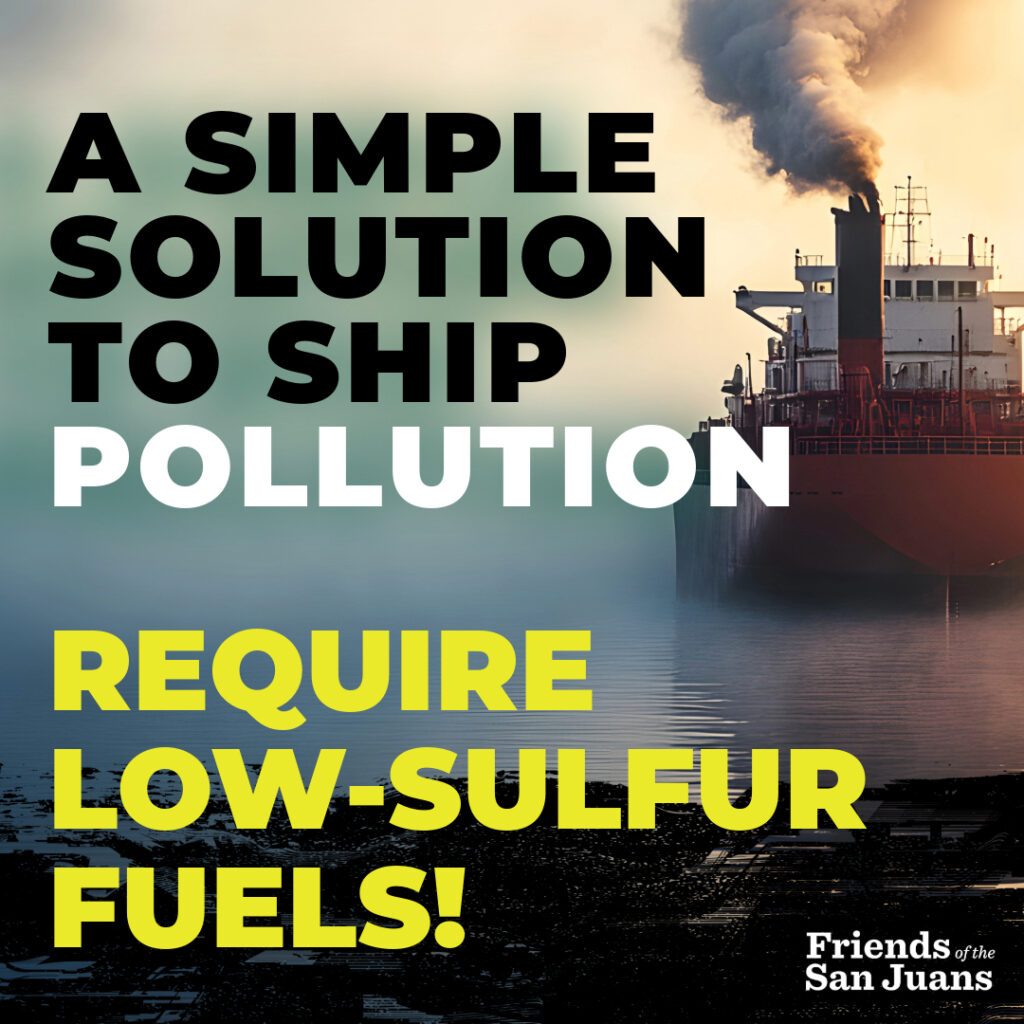
HB 1652 and SB 5519 won’t be moving forward this session, but the fight isn’t over. These bills would reduce environmental impacts associated with the operation of certain ocean-going vessels by requiring the use of low-sulfur fuels.
There’s still work to be done, and we’re not giving up!
Friends staff will continue to provide leadership in support of this legislation with our excellent team of ENGO colleagues and work with the prime sponsors, Representative Debra Lekanoff and Senator Liz Lovelett, to position this bill for successful passage in the next legislative session. Stay engaged with Friends on this issue because your voice will be needed to help require low-sulfur fuels in 2026. This bill will improve air and water quality for the critically endangered Southern Resident killer whales, salmon, shoreline communities, and marine economies!
Check out Representative Debra Lekanoff’s inspiring introduction of the bill at the House Committee on Environment & Energy hearing, and these testimonials from regional youth and Dr. Deborah Giles, Research Director for Wild Orca…
The Issue:
Large ocean-going ships with scrubbers are polluting Washington’s waters—and we have a chance to stop it. Friends of the San Juans is leading the effort to enact a bill that requires ships to use low-sulfur fuels—just like they are already required to do in California. This is the simple, effective solution we need to keep our waters, wildlife, and communities safe.
What are scrubbers?
An increasing number of ships use scrubbers in order to burn cheaper, more polluting heavy fuel oil that does not meet emissions requirements. Ships use scrubbers to remove sulfur from their exhaust—but instead of eliminating pollution, they dump it into our waters. Scrubber pollution contains heavy metals and other contaminants that harm marine life, threaten public health, degrade Tribal treaty-reserved fishing waters, and contribute to ocean acidification.
The Basic Facts
- Scrubbers move pollution from the air into our waters. Over 80% of scrubber-equipped ships discharge pollution directly overboard, contaminating marine habitats.
- This toxic discharge threatens salmon, Southern Residents, and people. The bioaccumulation of heavy metals and toxic chemicals in the food chain affects wildlife and human health.
- Most ships don’t use scrubbers. The majority of vessels already comply with emission rules by using low-sulfur fuels.
- Ships that use heavy fuel oil with scrubbers produce more air pollution than ships using low-sulfur fuels.
- Ships with scrubbers can switch to low-sulfur fuels without needing new or modified engines.
How a Legislative Bill Will Help
- Prevents pollution: Eliminates the need for scrubbers, keeping heavy metals, PAHs (toxic hydrocarbons), highly acidic sulfur oxides, and other pollutants out of our waters.
- Protects marine ecosystems: Safeguards eelgrass, bull kelp, salmon, and forage fish—the foundation of a healthy food web for endangered Southern Resident killer whales.
- Supports healthier communities: Reduces harmful air and water pollution that impacts public health, aquaculture, and coastal economies.
- Respects Tribal treaty rights: Clean water is essential for Indigenous communities who rely on these waters for fishing, cultural practices, and sustenance.
Take Action Now!
Send your appreciation to the prime sponsors of this legislation:
Rep. Debra Lekanoff
JLOB 422
PO Box 40600
Olympia, WA
98504-0600
[email protected]
Sen. Liz Lovelett
233 John A. Cherberg Building
PO Box 40440
Olympia, WA 98504
[email protected]
Learn More
- Environmental Non-Governmental Organization (ENGO), letters of support: ENGO letter of support for HB 1652.pdf and ENGO letter of support for SB 5519.pdf
- WA State Legislature bill information pages: HB 1652 and SB 5519
- Friends of the San Juans’ comments to Transport Canada on scrubber use in Canadian waters
- Impacts of exhaust gas cleaning systems (EGCS) discharge waters on planktonic biological indicators
- Pacific Environment reports: Poison in the water: The call to ban scrubber discharge and Ship pollution: From air to ocean
- Effects of Outfalls and Effluent on Eelgrass (Zostera marina L.): A Literature Review
- Heavy metal impact on growth and leaf asymmetry of seagrass, Halophila ovalis

Loving this place isn’t enough. We must protect it too.
If you have any questions, we’re here to help. Our team is dedicated to making environmental science, policy, and law accessible, empowering you to protect what makes this special place so extraordinary. Don’t hesitate to reach out—we’re in this together! ~ Friends of the San Juans, [email protected]
Keep the action alerts coming!
Friends of the San Juans needs your support to continue vital education, science, policy, and law to protect the San Juan Islands and the Salish Sea. If you find our action alerts informative and useful, please consider making a contribution!
